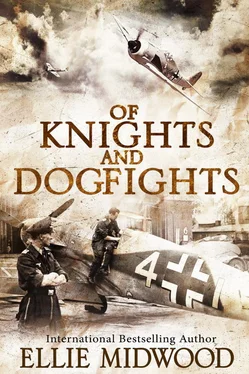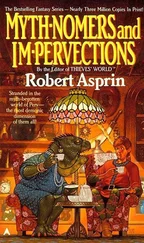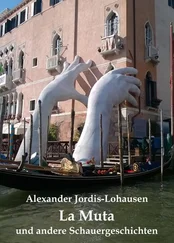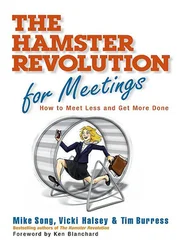Ellie Midwood - Of Knights and Dogfights
Здесь есть возможность читать онлайн «Ellie Midwood - Of Knights and Dogfights» весь текст электронной книги совершенно бесплатно (целиком полную версию без сокращений). В некоторых случаях можно слушать аудио, скачать через торрент в формате fb2 и присутствует краткое содержание. Город: New York, Год выпуска: 2018, ISBN: 2018, Издательство: Independently Published, Жанр: Историческая проза, prose_military, на английском языке. Описание произведения, (предисловие) а так же отзывы посетителей доступны на портале библиотеки ЛибКат.
- Название:Of Knights and Dogfights
- Автор:
- Издательство:Independently Published
- Жанр:
- Год:2018
- Город:New York
- ISBN:978-1-79217-060-7
- Рейтинг книги:3 / 5. Голосов: 1
-
Избранное:Добавить в избранное
- Отзывы:
-
Ваша оценка:
- 60
- 1
- 2
- 3
- 4
- 5
Of Knights and Dogfights: краткое содержание, описание и аннотация
Предлагаем к чтению аннотацию, описание, краткое содержание или предисловие (зависит от того, что написал сам автор книги «Of Knights and Dogfights»). Если вы не нашли необходимую информацию о книге — напишите в комментариях, мы постараемся отыскать её.
“It’s Großdeutsches Reich, soldier. When one has a family at home, it doesn’t leave him many chances for the revolt.”
Of Knights and Dogfights — читать онлайн бесплатно полную книгу (весь текст) целиком
Ниже представлен текст книги, разбитый по страницам. Система сохранения места последней прочитанной страницы, позволяет с удобством читать онлайн бесплатно книгу «Of Knights and Dogfights», без необходимости каждый раз заново искать на чём Вы остановились. Поставьте закладку, и сможете в любой момент перейти на страницу, на которой закончили чтение.
Интервал:
Закладка:
“No, I don’t blame her, really,” the prisoner would sigh, his shoulders drooping. “Five years is a long time. And she’s a young woman, of course… That all is understandable too…”
Those “unofficial divorce letters” were much worse than starvation, than all the hardships and all the commissars put together. It had a horrible effect on all of them, for even the ones who had never gotten such dreadful mail, would start tormenting themselves with thoughts of their wives and girlfriends, left behind. Five years! Who would blame them for not waiting?
The commissars appeared to catch onto that too.
“Your wife is asking you for a divorce.” The familiar Russian waved a letter in front of Johann’s face one summer day. “Would you care to sign?”
“You’re lying. She wouldn’t leave me,” Johann replied calmly, hoping that the commissar wouldn’t see his knuckles turning white as he clasped his hands on his knee.
“She found herself a new husband,” the commissar continued, his eyes following the lines in the letter. “She says, his name is Karl, he works in the police and he’s very good with children. She’s asking you to forgive her and hopes that you won’t hold it against her. She simply had to think of her family. The children needed a provider.”
Johann didn’t reply to anything. Lies. It’s nothing but lies, he kept repeating to himself like the most ardent of prayers.
“You see what you achieved with your obstinacy, Brandt? You could have gone home anytime you wanted but you chose to be stubborn for no reason. Look where it got you! Now, you’ve lost your wife, together with your children. And all because of your pigheaded attitude.”
Johann kept staring straight ahead of himself.
“Don’t you have anything to say?”
“Can I go back to work?”
“Yes, you can go back to work.”
Without seeing anything in front of himself, he stumbled back into the accountant’s office and fell into the chair, a heap of bones and broken hopes. A new accountant sat at the table; the SS fellow had gone home to Germany two months ago.
The Gulag. Autumn 1951
The commandant moved a paper toward him in a familiar gesture.
“Sign here.”
No preamble this time.
Johann had just opened his mouth to protest when the commandant spoke calmly. “It’s your release form. You don’t want to sign that either?”
Johann stepped forward and looked at the paper. It was in Russian, but by now he spoke it well enough to understand that it was not the usual NKVD garbage. I hereby state that I was not mistreated in any way during the time of my incarceration…
Could it be true? Were they indeed releasing him?
“Sign, sign, don’t fret! It’s real.” The commandant laughed. “You’re going home, Brandt. Congratulations.”
He signed under his name and shook the commandant’s outstretched palm. Together with about fifty prisoners, he was herded into showers and then given some roughly sewn clothes◦– much too baggy for their emaciated forms that resembled scarecrows much more than human beings. He still didn’t believe it when an old bus took their sorry lot to a train station. He still looked for some malice in it even when the train started rolling westward, taking them further and further from the place of their imprisonment. Only when they crossed the border with Germany did it dawn on him that he was home at last… only was there anyone home waiting for him? He thought about it long and hard and decided to go to his parents’ house instead of Berlin.
The small platform was brimming with townsfolk, a sea of expectant faces shouting out the names of their relatives into the small crowd of newly arrived former POWs. Some simply held signs above their heads, with photographs attached. Hermann Schmitt, born 1920. Brown hair; blue eyes. Army Group Center, Company… Taken prisoner in 1943. Do you know him?
Johann pushed his way through the crowd, not recognizing a single face. Suddenly, a young man grabbed him by the sleeve and threw himself around his neck. Through a film of tears, Johann barely recognized Harald, his little brother who stood taller than him now. A young woman stood shyly behind his back, holding a little blonde girl’s hand.
“My wife, Irma. And this is Geli, our daughter.”
Johann shook the pretty brunette’s outstretched hand.
“What on earth are you doing here? I thought you’d go straight to Berlin to Mina!” Harald wouldn’t stop hugging him and patting him, relief and concern written all over his face at the sight of his brother.
Johann parted his lips as though to say something but then suddenly couldn’t speak a word.
“How is she?” He finally forced himself to utter at least something.
“She’s all right, considering. She has a good position in a bank, and Frau von Sielaff is taking care of the children.”
Johann held his breath, searching his brother’s face for clues.
“And what about Karl? Doesn’t he work?”
“Who’s Karl?” Harald seemed genuinely confused.
Johann released a breath he didn’t realize he’d been holding all these months.
“Is there a phone nearby? I need to make a call.”
“Over there, at the post office. It’s five minutes away.”
Johann had never been so nervous in his life, not even during the worst of the attacks, as he was now, with the black phone pressed to his ear.
“Hello?” A little voice answered, clearly belonging to a child.
For a moment, Johann didn’t know what to say.
“Hello?” The voice repeated.
Johann swallowed a lump in his throat. “Wilhelm? Is that you?”
“No, it’s Gerd. Who’s calling?”
“It’s…” Johann rubbed his face ferociously, collecting himself into something that could think rationally again. “Is your mother home?”
“No, Mama’s at work. Only my grandmother and my brother are here.”
“Could you call your grandmother to the phone, please? Tell her, it’s Johann. She’ll know.”
Silence. Then, a soft, “Papa, is that you?”
Johann slid down the wall, hiding his face in his hands, sobbing openly for the first time in years. Harald quickly burst inside and picked up the phone.
“Gerd, is that you, my little fellow? It’s your uncle, Harald. Be a good lad and call your grandmother to the phone, will you? Yes, Bubi, it was your Papa. He’s coming home soon.”
Note to the Reader
Despite this novel being a work of fiction, the two central characters◦– Johann and Willi◦– are based on two actual Luftwaffe fighter aces, Erich Hartmann and Hans Joachim Marseille, respectively. The two never served together, as Marseille, nicknamed The Star of Africa for his brilliant performance during the African campaign, died before Erich Hartmann began scoring his victories on the Eastern Front. I’ve studied both extensively, for quite some time and the idea of what could have been if the two had met in real life or◦– even better◦– had a chance to serve together, wouldn’t leave me in peace until I started outlining, Of Knights and Dogfights.
Both Erich Hartmann and Jochen (as he was called by his comrades) Marseille were not only extremely gifted fighter aces but incredibly kind and liberal young men, who resented the Nazi Party and everything it stood for. Both were known for their gallant and respectful treatment of their prisoners of war and their chivalrous attitude to their downed counterparts. Many instances, described in the novel, such as them inviting their downed POWs into their tents and striking a friendship with them, or aiming exclusively at the engine in order to cripple the aircraft and leave the pilot uninjured, as well as delivering notes about the fate of captured airmen, to the enemy airbase, are based on true events. Marseille was particularly famous◦– or infamous◦– for it, trying his utmost to inform the enemy of their comrades’ fates whenever the occasion presented itself, causing the wrath of his superiors for risking his life each time he set out on such a dangerous enterprise, during which he could have easily been shot down by enemy flak.
Читать дальшеИнтервал:
Закладка:
Похожие книги на «Of Knights and Dogfights»
Представляем Вашему вниманию похожие книги на «Of Knights and Dogfights» списком для выбора. Мы отобрали схожую по названию и смыслу литературу в надежде предоставить читателям больше вариантов отыскать новые, интересные, ещё непрочитанные произведения.
Обсуждение, отзывы о книге «Of Knights and Dogfights» и просто собственные мнения читателей. Оставьте ваши комментарии, напишите, что Вы думаете о произведении, его смысле или главных героях. Укажите что конкретно понравилось, а что нет, и почему Вы так считаете.












